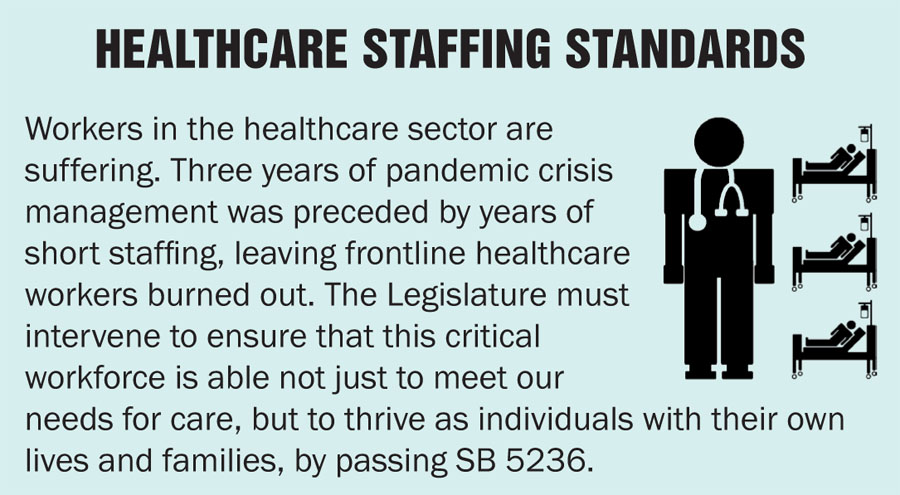STATE GOVERNMENT
Where pro-worker bills stand in Olympia
UPDATED at 9 a.m. on Thursday, March 30.
OLYMPIA (March 28, 2023) — More cutoff dates are looming for bills being considered by the Washington State Legislature, starting with this Wednesday’s deadline for bills that have passed the House or Senate to advance from the opposite house’s policy committee.
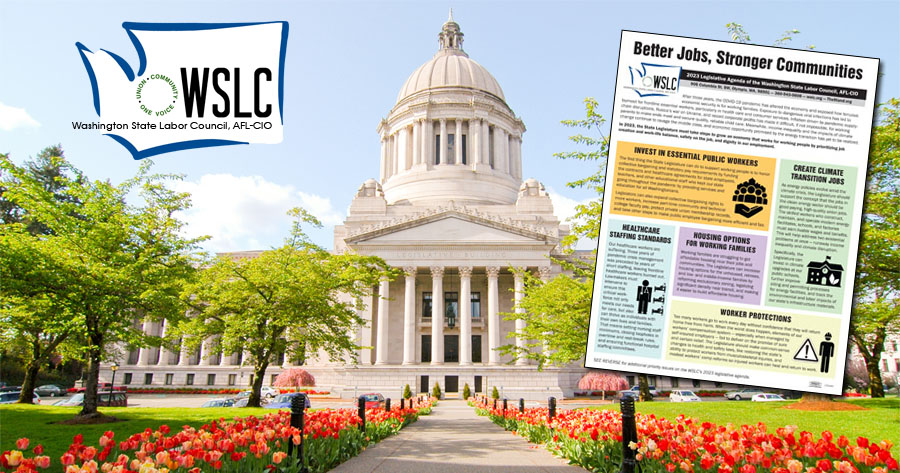
Here is a status report — effective Tuesday morning, March 28 Thursday morning, March 30 — on some of the bills supported by the Washington State Labor Council, AFL-CIO from its “Better Jobs, Stronger Communities” 2023 legislative agenda. (Follow the bills’ links for their up-to-the-minute status.)
NOTE: The following is not a comprehensive list of all of the proposed legislation supported by the WSLC. In the interest of brevity, some WSLC-supported bills that missed previous cutoff deadlines (including companion bills that “died”) are not listed in this update.
TAKE A STAND — Call the Legislative Hotline at 1-800-562-6000 to leave a message for your state senators and representatives in support of any of these important bills.
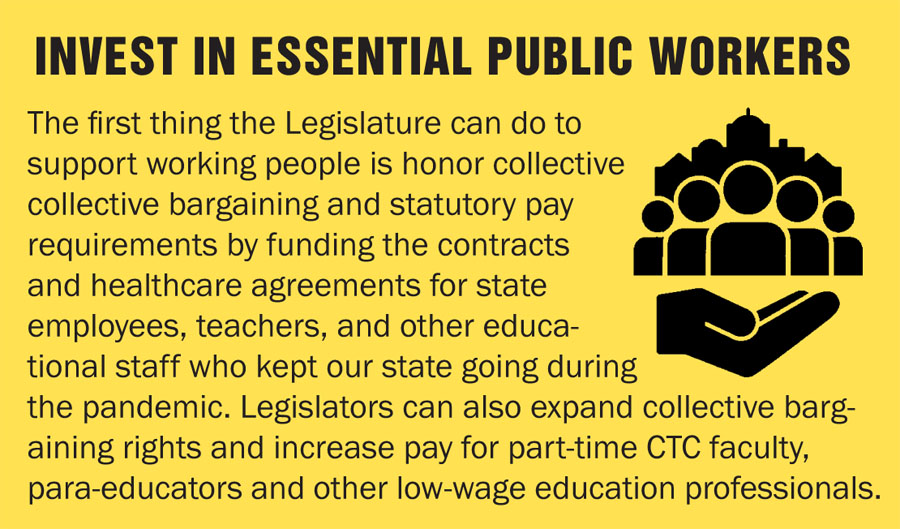
The budgets proposed by majority Senate and House Democrats include funding for the state employee contracts/COLAs and $1,000 bonuses for getting a COVID booster shot; statutorily required COLAs for teachers; and rate increases for providers of long-term care which should translate into higher pay for in-home providers and employees of adult family homes, skilled nursing facilities and assisted living facilities. Senate and House capital budget proposals are currently being analyzed.
► Expand Collective Bargaining Rights — Frontline state supervisors in Washington Management Service (HB 1122), and academic student employees (HB 1291/SB 5238) at regional four-year universities should have the right to join together in unions and negotiate for better wages and working conditions.
HB 1122 passed the House 88-8; passed Senate Labor and Ways & Means; now in Rules. HB 1291 passed the House 69-27; passed Senate Labor; now in Rules. SB 5238 passed the Senate 34-15; passed House Labor; now in Appropriations.
► Minimum Standards for Bargaining Unit Information (HB 1200) — To ensure that unions can deliver on their duty to represent all employees—in good faith and without discrimination—public employers shall provide employee contact information to an exclusive bargaining representative within certain time limits.
HB 1200 passed the House 56-41; passed Senate Labor; now in Rules.
► Protect Private Member Records (HB 1187) — Protect union membership records from employers’ fishing expeditions in lawsuits to which the union is not a party.
HB 1187 passed the House 95-0; passed Senate Law & Justice; now in Rules.
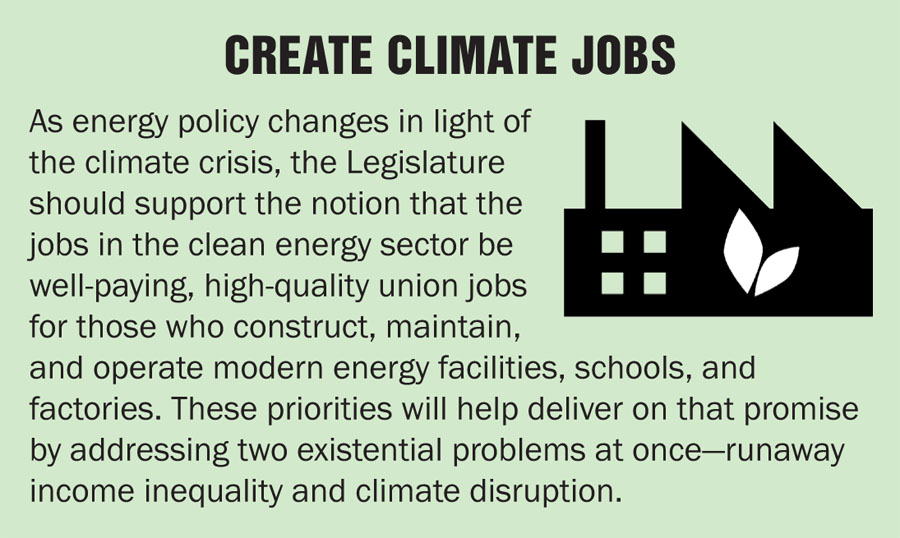
► Siting and Permitting (HB 1216) — Legislators should build on improvements to energy facility siting and permitting processes made in 2022. As our state’s energy strategy evolves, these processes must also adapt to ensure timely, predictable reviews without denying impacted communities substantive opportunities for input.
HB 1216 passed the House 75-20; passed Senate Environment; now in Ways & Means.
► Buy Clean/Buy Fair (HB 1282) — The state spends billions every year on construction materials for public infrastructure, which are often manufactured overseas in countries with poor labor standards and inadequate environmental protections. The state should pilot a program to track the labor and environmental impact of the materials it purchases to build our roads, bridges, and public buildings.
HB 1282 passed the House 57-40; passed Senate Environment; now in Ways & Means.
► Climate Upgrades to Schools — The opportunity to reduce energy consumption by modernizing our schools is enormous. Energy conservation and generation advancements, HVAC and heating upgrades, water improvements, and other investments will lower related carbon emissions, improve student and staff health, and create thousands of quality construction jobs.
This is budget-related and not subject to cutoff deadlines. Senate and House capital budget proposals are currently being analyzed.
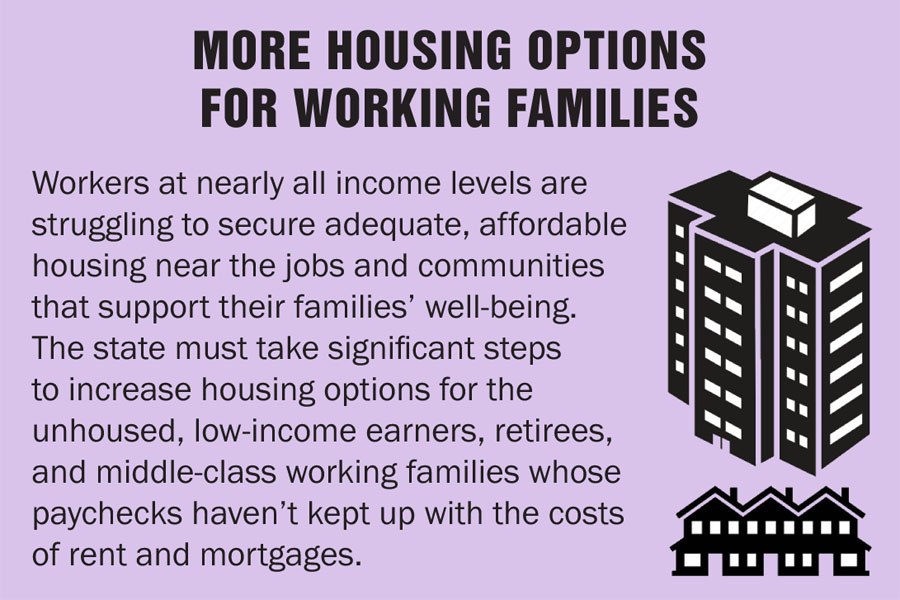
► Reform Exclusionary Zoning (HB 1110) — Zoning that blocks construction of more affordable, denser housing should be reformed so more housing options are available for wage-earning workers and their families.
HB 1110 passed the House 75-21; passed Senate Housing; now in Ways & Means.
► Legalize Significant Density Near Transit (SB 5466) — To maximize the benefits of our transportation investments—and give people more options for trips to work, school, and the grocery store—legislators should take significant steps to promote transit-oriented development.
SB 5466 passed the Senate 40-8; now in House Capital Budget.
► Make It Easier to Build (HB 1167) — By streamlining permitting processes, lawmakers can remove barriers to housing construction and lower homes’ costs.
HB 1167 passed the House 95-0; passed Senate Local Government; now in Ways & Means.
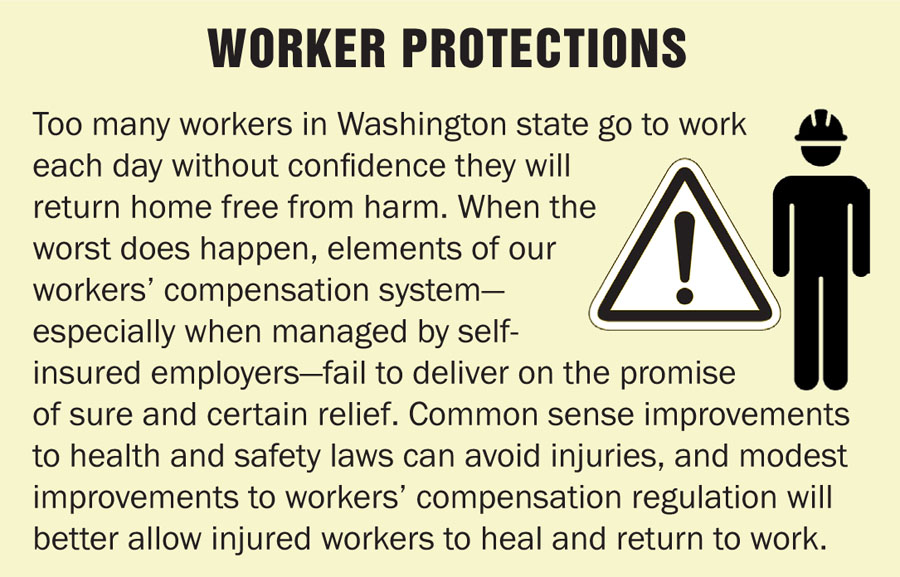
► Washington Safe at Work (SB 5217) — The state is prohibited from adopting common sense rules to avoid work-related musculoskeletal disorders due to a business-run initiative 20 years ago. The Legislature should allow L&I to adopt such regulations to avoid these biggest drivers in workers’ compensation claims and costs.
SB 5217 passed the Senate 27-21; passed House Labor; now in Appropriations.
► Reform Compelled Medical Exams (HB 1068) — In workers’ compensation claims, workers are often subjected to compelled examinations by third-party doctors who fail to adequately review medical files or meaningfully assess the injured workers. Workers should be allowed to record these exams, as in non-workers’ comp litigation.
HB 1068 passed the House 65-33; passed Senate Labor; now in Rules.
► Hold TPAs Accountable in Workers’ Comp (HB 1521)— Employers that self-insure workers’ compensation often utilize third-party administrators to aggressively manage claims, reduce injured workers’ benefits, and drag out litigation that results in settlements for pennies on the dollar. The Legislature should adopt stricter standards and increase penalties when TPAs’ actions result in unlawful delays in benefits and abuse of injured workers.
HB 1521 passed the House 69-27; passed Senate Labor; now in Rules.
► PTSD Occupational Disease for Health Care (SB 5454) — Healthcare workers are consistently exposed to the physical, psychological, and emotional trauma of their patients, creating a toll on these workers’ own wellbeing. In recent years, the Legislature has expanded workers’ compensation protection to other workers with PTSD due to regular—instead of just singular—traumas, Lawmakers should do the same for healthcare workers.
SB 5454 passed the Senate 35-13; passed House Labor; now in Appropriations.
► Warehouse Worker Protections (HB 1762) — Workers in largely automated warehouses, particularly those owned by Amazon, experience significantly higher injury rates due to lax health-and-safety protections and demanding quotas that pit workers against automated fulfillment systems. The Legislature should put sideboards on this model to avoid worker exploitation and to protect their health.
HB 1762 passed the House 53-42; passed Senate Labor; now in Rules.
► Personnel Files (HB 1320) — Workers have a right to know what information employers put in their personnel files. The Legislature should enforce that right.
HB 1320 passed the House 56-40; passed Senate Labor; now in Ways & Means.
► Highway Worker Safety (SB 5272) — Our state highways are some of the most dangerous job sites in the state, especially for those who build, maintain, and improve this critical infrastructure. Lawmakers should adopt higher safety standards to ensure these workers return home unharmed every day.
SB 5272 passed the Senate 47-2; passed House 96-0.
► Unemployment for Caregivers (HB 1106) — Current unemployment insurance law makes it difficult for workers with caregiving responsibilities at home to find suitable work at times or locations that work for their families. The Legislature should adjust the “good cause quit” standards to accommodate modern family care giving needs.
HB 1106 passed the House 51-44; passed Senate Labor; now in Rules.
SB 5236 passed the Senate 35-13; passed House Labor; now in Appropriations. The final bill reflects a compromise between healthcare worker unions and hospital executives after negotiations led by Sens. June Robinson (D-Everett) and Mark Mullet (D-Issaquah).
WORKFORCE DEVELOPMENT
Washington has a need for deep investment in workforce development. We must widen the pipeline for skilled, professional nurses and other healthcare workers, secure and grow our manufacturing workforce to leverage domestic supply chain development opportunities, and to build the climate and transportation infrastructure necessary to deliver on our state’s energy transition.
Manufacturing
► SB 5269 would study manufacturing opportunities to identify the best sectors to accelerate production of materials necessary for our state’s energy transition. This analysis should include the needs of current manufacturing employers, including supply chain challenges and opportunities to attract new investments. This will help our state hone its competitive edge in industrial employment.
SB 5269 passed the Senate 28-20; passed House Economic Development; now in Appropriations.
► Aviation is a critical component of our manufacturing sector. The state should continue its $2 million annual aviation workforce and apprenticeship investments.
This is budget-related and not subject to cutoff deadlines. Senate and House budget proposals are currently being analyzed.
Grocery
► Meat Cutting and Fishmonger apprenticeships provide workers in the grocery sector an opportunity to improve their skills and earnings, securing quality careers in a trade that is in high demand by food industry employers. The state should invest $1 million to match private dollars in union grocery apprenticeship programs.
This is budget-related and not subject to cutoff deadlines. Senate and House budget proposals are currently being analyzed.
Health Care
► Nurse educators’ compensation at 4-year universities must be improved, building on progress made at CTCs.
► Building the healthcare workforce from within with matching funds for joint labor-management programs appropriated by the Legislature. This will expand the pipeline for desperately needed frontline care providers.
These are budget-related and not subject to cutoff deadlines. Senate and House budget proposals are currently being analyzed.
Construction
► HB 1176 would study future clean energy necessities to identify the needed occupations and skill sets that our green energy transition requires. A committee of training providers should be included to inform the study’s findings.
HB 1176 passed the House 59-37; passed Senate Higher Education; now in Ways & Means.
► HB 1050 would extend apprenticeship utilization standards to subcontractors on state projects and to local governments.
HB 1050 passed the House 58-39; passed Senate Labor; now in Rules.
► K-12 pre-apprenticeship investments that expand Core Plus offerings in to new crafts.
This is budget-related and not subject to cutoff deadlines. Senate and House budget proposals are currently being analyzed.
Job Skills Program
► Increase funding for the Job Skills Program so that more employers can seek matching funds to modernize incumbent worker training in sectors requiring new skills or technology to remain competitive.
This is budget-related and not subject to cutoff deadlines. Senate and House budget proposals are currently being analyzed.
EDUCATION
Educational investments are a core duty of state government, the prioritization of which pays dividends in terms of students’ social and emotional health, and economic wellbeing. Supporting teachers, faculty, and employee wages, reasonable levels of staff, and making investments in nutrition and early learning will be a significant priority in 2023.
► Fund Statutory K-12 and CTC Inflationary Wage Increases and General Living Wage Salary Increases for Faculty and Staff — This investment will improve our institutions’ ability to retain and recruit educators to best serve students’ needs.
This is budget-related and not subject to cutoff deadlines. Senate and House budget proposals are currently being analyzed.
► Public School Nutrition (HB 1238) — Provide free access to school meals to ensure students have a solid foundation for learning and health.
HB 1238 passed the House 93-3; passed Senate Education; now in Ways & Means. It was amended by the House Appropriations Committee to expand access to free school meals to 90,000 students who previously did not qualify for the program, as opposed to all students.
EARLY LEARNING & CHILD CARE
○ Bonus for Non-Standard Hours (DCYF) — Adopt rate enhancement for providing non-standard hours of care at Early Achievers facilities. By broadening the available hours of child care, the Legislature will make it more accessible for working parents in critical 24-hour jobs where the work day starts early, ends late, and for shifts that run overnight.
This is budget-related and not subject to cutoff deadlines. Senate and House budget proposals are currently being analyzed.
○ Flexible Work & Income Requirements for Apprentices (SB 5088 and HB 1525) — As workers transition in to apprenticeship programs, many find themselves disqualified from necessary public support. The Legislature should make Working Connections available for those enrolled in state-registered apprenticeships, and should raise the SMI threshold for meaningful apprenticeship access to childcare assistance. Further, DSHS should seek a federal waiver to income eligibility criteria for first-year apprentices.
SB 5088 passed the Senate 49-0; passed House Labor; now in Rules. HB 1525 passed the House 96-0; passed Senate Education; now in Ways & Means.
○ Near Site Childcare Pilots Job Skills Program Fund — A pilot to explore construction job-site proximate childcare facilities with subsidies to support childcare access.
This is budget-related and not subject to cutoff deadlines. Senate and House budget proposals are currently being analyzed.
► Teacher Residency (HB 1565) — Support teacher residencies that are diversifying the workforce, addressing subject-matter staffing shortages and improving retention.
HB 1565 passed the House 69-37; passed Senate Education; now in Ways & Means.
HEALTH & WELL-BEING
Washington state has a social safety net that provides meaningful support for families when they need it most. However, there are gaps through which workers fall that the Legislature should prioritize filling so no one is left behind.
► Paid Family & Medical Leave (SB 5286) — The Legislature should pass into law the recommendations made by the PFML Legislative Task Force to ensure the financial health of this extremely popular and effective program.
SB 5286 passed the Senate 48-0; passed House Labor; now in Appropriations.
► Sick Leave for Construction Workers (SB 5111) — Our state’s landmark sick leave law approved by voters in 2016 has helped workers take better care of themselves and their families. However, many construction workers are unable to utilize this benefit due to the revolving nature of their employment. The Legislature should provide flexibility to ensure these workers can better utilize this benefit.
SB 5111 passed the Senate 48-0; passed House Labor; now in Rules.
► Rail Worker Leave (SB 5267) — Despite years of attempting to secure basic rights to sick leave, railroad workers remain one of the few groups of workers without this core protection. These bills would provide job protections for rail workers when they take certain unpaid leave. Rail workers are only asking not to be fired or disciplined when they must take unpaid leave for illnesses or absences.
SB 5267 passed the Senate 42-7; passed House Labor; now in Rules.
► Fire Proofing Materials (HB 1323) — When there’s a fire in a commercial building, dozens—if not hundreds or thousands—of lives can be at risk. Time makes all the difference in saving those inside. The proper application of fire proofing materials buys the time necessary for occupants to exit and for first responders to do their duty. The Legislature should adopt training and certification requirements to ensure that this critical element of fire safety is always performed correctly.
HB 1323 passed the House 97-0; passed Senate Labor; now in Rules.
► Health Care for Bus Drivers — School districts contract transportation services to contractors that fail to provide adequate health and pension benefits. The Legislature should ensure contracted bus drivers, who provide the same exact services as school district employed bus drivers, have comparable benefits.
This is budget-related and not subject to cutoff deadlines. Senate and House budget proposals are currently being analyzed.
RETIREMENT
Washington’s labor community supports the full funding of our public pensions and improvements for those whose benefits are low or out of synch with their needs (HB 1055). This includes cost-of-living adjustments for plans that do not already have them worked into their structures, like PERS and TRS Plan 1 (HB 1057/SB 5350).
HB 1055 passed the House 96-0; passed Senate Ways & Means; now in Rules. HB 1057 passed the House 96-0; passed Senate Ways & Means; now in Rules. SB 5350 passed the Senate 48-0; passed House Appropriations; now in Rules.
REVENUE
Washington state has the most regressive, upside-down, and backward tax system in the country. Low-and-middle income families pay far more of their income than so the wealthiest to support our schools, safety net programs, and public safety. The labor community supports revenue options that secure high-quality public services and jobs, but that do not fall on working families. Further, when tax preferences are considered, they should be tied to strict labor standards which promote the highest quality and number of jobs practicable.
This effort applies to multiple bills on tax preferences. This is budget-related and not subject to cutoff deadlines. Senate and House budget proposals are currently being analyzed.
In addition to this 2023 WSLC Legislative Agenda, the WSLC supports other legislation championed by its affiliated unions and a range of issues to address economic opportunity and justice.

